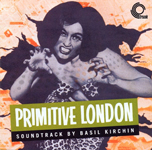|
|
 |
Dusted Reviews
Artist: Basil Kirchin Album: Primitive London Label: Trunk Review date: Jun. 17, 2011 |

|
|
|
 |
Directed by Arnold L Miller, Primitive London is a 1965 exploitation film that frames the city as a perverse, surreal space, bringing the repressed daylight psyche out into the night time world. Playing loose with its metaphors, it analogizes the presentation of showgirls’ bodies with the conveyor-belt logic of meat on the rack (chicken, in this instance); businessmen ogle young women, fat flesh is pounded in massage, and leather boys flirt with the screen. It’s a wonderfully dotty work of art that aimed for prurience but nowadays lands closer to quaint, with a dash of the unsettling.
Miller’s films from the ‘60s — Primitive London, 1963’s Take Off Your Clothes And Live, 1964’s West End Jungle and1965’s London In The Raw — were part of a broader cultural shift in England that swept the post-war ashes out of Swinging London’s eyes. In many ways, films like Primitive London, framing their Mondo tactics within the debased underworld of the city in its newly ‘liberated’ form, are truer period pieces than the more romanticized visions of the city’s new dream world, and in this respect (if practically no other) they are natural successors to Free Cinema "psychogeographic snapshots" like Lindsay Anderson’s O Dreamland, or Goretta & Tanner’s Nice Time.
So it’s also somehow exemplary of the freedoms of the era to get Basil Kirchin — library musician, jazz drummer, composer, and soon to record two of Britain’s most wonderfully bizarre records, the two volumes of Worlds Within Worlds — to work on the Primitive London soundtrack. It’s also telling of a shift in both the artistic premises and the industrial-cultural conditions of the soundtrack. Ten years prior, Karel Reisz and Tony Richardson tracked Momma Don’t Allow with the Chris Barber Band, while Nice Time danced to the sounds of the Chas McDevitt Skiffle Group; by the time of Primitive London, however, Kirchin was inveigling raw-handed experimentation into jazz melodicism.
Kirchin has a good sense of how to communicate both sleaze and unease. The third section of music from Primitive London starts with a brass instrument leering its way into audition, before a classically wound jazz chord sequence descends down your lugholes. There’s something lugubrious and unsettling about the whole affair, as Kirchin humanizes the instruments, similar to Ennio Morricone — that brass really does speak to you. Elsewhere, the soundtrack drifts into more unsettling territory, with the graveyard drones of “Primitive London 4,” mosquito swarms of treble swimming through the backdrop. By this stage, and the following “5," Kirchin has left the melody head way behind and is out there on his own – this is a clear predecessor to his more "outré" productions of later years.
The set is completed by his work for another (apparently unissued) film, Francis Megahy’s The Freelance. Subtitled "abstract jazz 1," "2," etc., Kirchin is working in similar territory to the latter parts of the Primitive London soundtrack, with melodic fragments pulled from various instruments and strung across a softly played skyline of halatial organ drones and tones. When it resolves to structure, like the snippets of groovy jazz-lite that punctuate "abstract jazz 1," it’s an odd gambit — especially as minutes later, the rhythm section are pulling free-form music and movement shapes out of their hi-hat and double-bass.
Both soundtracks have their many charms — and both are reminders of the quietly visionary work of Kirchin, one of Britain’s most underestimated film composers and avant-technicians. On this soundtrack, you can hear Kirchin drawing from his background in skiffle and jazz groups, dragging the music into his very peculiar private world, where it interfaces with the Carnaby bluster of psychedelia, the hot blowing of ‘60s jazz forms, and the scientific dissections of the Radiophonic Workshop and the Electronic Music Studios (London) Ltd. This is ‘60s proto-psych bricolage at its finest.
By Jon Dale
|







